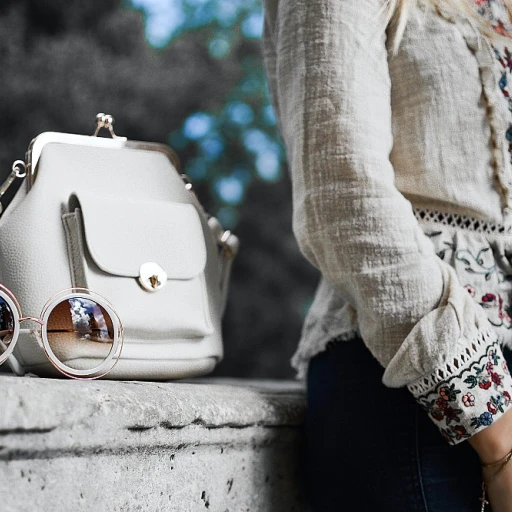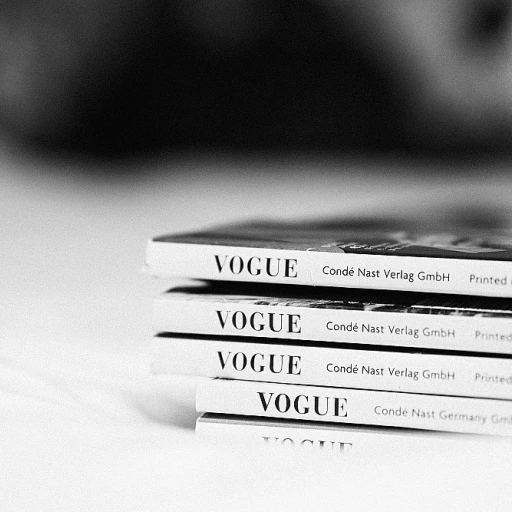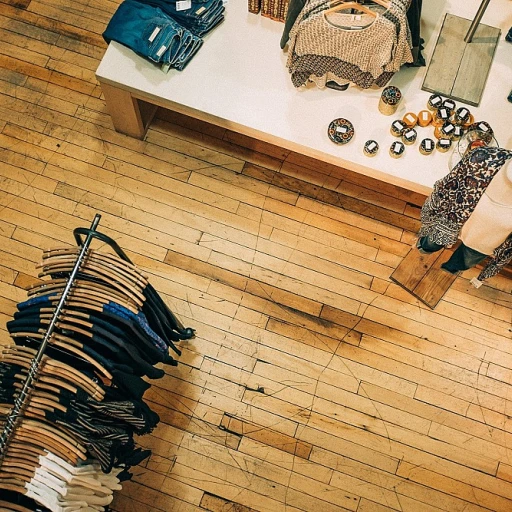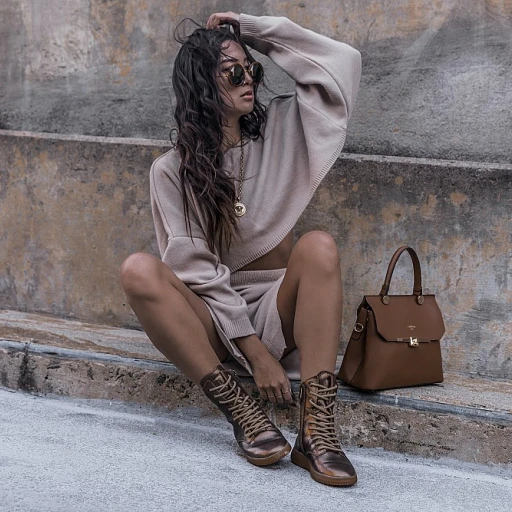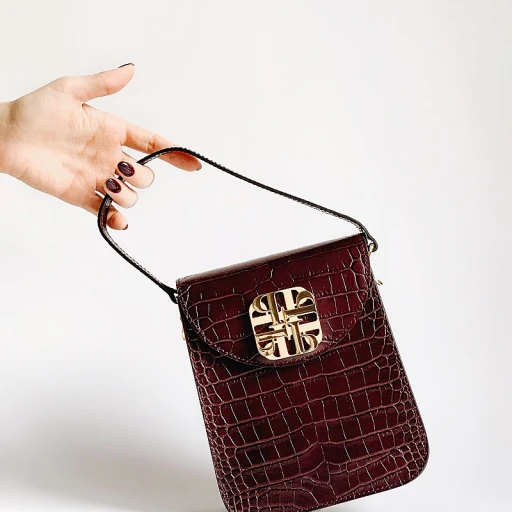The Sustainable Sole-Searching Journey
The Quest for Eco-Friendly Footwear
As the world becomes increasingly attuned to the importance of sustainability, the fashion industry is stepping up, proving that style and eco-consciousness can walk hand in hand. Sustainable shoes have become a cornerstone for the eco-friendly elegance movement, capturing the attention of fashion enthusiasts and environmental advocates alike. Recent statistics suggest that the global eco-friendly footwear market is expected to grow significantly, with Allied Market Research predicting it to reach $11.8 billion by 2027, progressing at a CAGR of 6.2% from 2020 to 2027.
Innovations Fueling a Greener Path
The journey towards sustainable shoes is paved with innovation. Cutting-edge materials like biodegradable fabrics and recycled plastics are revolutionizing the industry, turning waste into wearable art. These strides in sustainable shoe manufacturing aren't just a fad but a glimpse into a future where fashion harmonizes with the planet. Brands are racing to create footwear that doesn't leave a lasting impression on the Earth, instead of focusing on decomposable, renewable resources that merge environmental responsibility with chic design. A study by MIT highlighted that a typical pair of sneakers emits 30 pounds of carbon dioxide equivalent through its life cycle, emphasizing the necessity for change in shoe production practices.
Embracing the Green Shoe Movement
As consumers become more environmentally conscious, their shopping habits evolve. The sustainable shoe trend is gaining traction, with searches for sustainable footwear increasing year over year. The sentiment mirrors the 2020 McKinsey Fashion on Climate report, which found that the fashion industry accounts for about 4% of global greenhouse-gas emissions, motivating innovations like eco-friendly soles and vegetable-tanned leathers. By choosing sustainable shoes, fashion lovers send a powerful message about their commitment to the environment and their passion for cutting-edge fashion that respects our planet's limits.
"With every step towards sustainable shoes, we aren't just choosing what to wear; we're deciding the world we want to live in." This profound sentiment from a leading fashion influencer encapsulates the essence of the movement towards eco-friendly elegance. As pioneering brands and consumers march towards a sustainable future, the fashion realm is being redefined, ushering in an era of footwear innovation that honors both style and substance.
Material Matters: Innovations in Eco-Friendly Footwear
Revolutionizing Fashion with Eco-Conscious Materials
As the trend towards sustainability in fashion accelerates, materials used in creating sustainable shoes are undergoing a revolutionary transformation. The industry's commitment to reducing its environmental impact has led to the exploration and adoption of innovative materials. One notable example is the use of bio-based leathers, which can provide the same luxurious feel and durability as traditional leather without the heavy ecological footprint. Piñatex, made from pineapple leaf fibers, is a prime example, being both cruelty-free and biodegradable. According to a report by Grand View Research, the global eco-friendly footwear market size was valued at USD 7.69 billion in 2020 and is expected to expand at a compound annual growth rate (CAGR) of 5.8% from 2021 to 2028.
Innovative Technology Meets Timeless Style
Another aspect of sustainability in fashion is the integration of cutting-edge technology to create eco-friendly shoes. 3D printing, for instance, offers an opportunity for made-to-order shoes, reducing waste and overproduction. The use of recycled plastics, turning ocean waste into stylish footwear, is pioneering a new wave of sustainable fashion. Adidas, in collaboration with Parley for the Oceans, released their line of sneakers that incorporate recycled ocean plastic, boasting sales of more than one million pairs in 2017. The statement, 'From Threat into Thread,' summarizes the company's mission to turn environmental challenges into innovative design solutions.
Reducing the 'Carbon Footwear' with Alternatives to Synthetics
Synthetic materials, long a staple in shoe manufacturing, are being replaced by eco-friendlier alternatives. Recent surveys suggest consumers are growing increasingly conscious about the materials in their apparel, with 67% expressing a preference for sustainably produced goods. Cork, organic cotton, and natural rubber are just some materials that offer a lower carbon footprint than their synthetic counterparts. These materials not only decrease dependency on fossil fuels but also promote a circular economy–ensuring products can be recycled or composted end-of-life, thus feeding back into the ecosystem.
Cultivating Connections Between Tradition and Technology
The fusion of traditional craftsmanship and modern technology paves the way for new possibilities in sustainable shoe design. Brands that utilize the handiwork of artisans, while embedding sustainable practices, create a powerful narrative around their products. For instance, VEJA sneakers, known for their transparency, blend organic materials with ethical labor practices. Their strategic approach positions them not only as footwear manufacturers but as catalysts for positive change within the fashion industry. Encouraging statistics show that global searches for sustainable goods have increased by 71% since 2016, indicating that the trend is not a fleeting one but rather a lasting shift in consumer behavior.
Step into the Future: Brands Leading the Charge
Pioneers Paving the Way in Sustainable Shoewear
As conscious consumers embark on their sustainable sole-searching journey, a wave of innovative brands is revolutionizing the industry. Companies like Allbirds, Rothy's, and Veja are not just making ripples; they're creating a sustainability tsunami. With a clear commitment, these brands exemplify the potential for eco-friendly elegance in the fashion world. "Sustainability is no longer a trend, it's a necessity," says Tim Brown, co-founder of Allbirds, a sentiment echoed by the 2020 report from The Business Research Company, which noted a 9.1% growth in the ethical fashion market.
Trailblazers in Eco-Conscious Footwear
- Allbirds - Known for their carbon-neutral promise, they utilize natural materials like merino wool and sugarcane-based soles.
- Rothy's - They craft stylish flats and sneakers from recycled plastic water bottles, turning waste into want.
- Veja - A hit among fashion enthusiasts, they use wild rubber and organic cotton, setting a benchmark for sustainability.
These brands not only innovate in eco-friendly footwear but also constantly improve their practices. According to Vogue, Rothy's recycled over 45 million water bottles for their shoes as of 2019, a significant achievement for environmental stewardship within the fashion industry.
Green Soles Stepping into the Limelight
The trendsetters of the eco-friendly footwear movement are gaining traction not just for their green initiatives but also for their unwavering quality and style. Celebrity endorsements have played a role, with figures like Emma Watson and Leonardo DiCaprio supporting sustainable shoe brands. This high-profile advocacy brings sustainability into the spotlight, suggesting that the luxury of choice no longer has to compromise the health of our planet. According to a survey by Nielsen, 73% of global millennials are willing to pay extra for sustainable offerings, a stat that underlines the growing market for responsible fashion.
Impacting Footprints: The Consumer and the Carbon Footprint
Evaluating the Carbon Footprint of Your Footwear Choices
As fashion enthusiasts seek to balance their love for style with environmental consciousness, the carbon footprint of their wardrobe has become a crucial talking point. In the realm of sustainable shoes, understanding the carbon footprint is essential for making informed choices. A recent study published by the Journal of Cleaner Production indicates that the footwear industry contributes to 1.4% of global greenhouse gas emissions, revealing the importance of considering the ecological impact of our shoes. As consumers, we have the power to change these statistics by choosing brands that prioritize sustainable practices.
The Power of Eco-Conscious Consumption
Embracing eco-friendly footwear is a stylish step toward reducing our environmental impact. By selecting shoes crafted from sustainable materials and produced in ethical factories, consumers can significantly lower their wardrobe's carbon footprint. A compelling statistic from the Environmental Protection Agency underscores that textiles contribute to nearly 5% of all landfill content, a number which can be reduced with eco-conscious consumption. Opting for durable, timeless designs also promotes a reduce-and-reuse mindset, slowing down the fast fashion cycle.
Brands That Support Your Sustainable Lifestyle
- BrandX: Pioneering the use of recycled rubbers, contributing to a 20% reduction in their manufacturing carbon footprint.
- BrandY: Offering a shoe recycling program, ensuring that every pair lives on beyond its usual lifespan.
- BrandZ: A leader in the industry, committing to a carbon-neutral future by 2030 with transparent reporting on progress.
Choosing to support such brands not only aligns with ethical values but also motivates other companies to follow suit. According to a Nielsen report, 73% of global consumers say they would change their consumption habits to reduce environmental impact, which signals a growing market for sustainable shoe brands committed to innovation and transparency.
Adopting a Mindful Approach to Fashion
A transition to sustainable shoes begins with a mindful approach to fashion. Engaging with the origins and lifecycle of our footwear allows us to appreciate the effort behind eco-friendly innovations. The 'slow fashion' movement, an approach that emphasizes quality and sustainability, has gained traction as consumers seek to minimize waste. According to a survey by McKinsey & Company, 67% of consumers consider the use of sustainable materials to be an important purchasing factor. This shift suggests a promising future for brands that place sustainability at the core of their business model.
Walking the Talk: How to Incorporate Sustainable Shoes into Everyday Fashion
Embracing Eco Chic in Every Step
As we explore the realm of sustainable shoes, we must acknowledge the importance of integrating these eco-friendly choices seamlessly into our daily wardrobe. This isn't just about making a fashion statement, but a conscious movement towards reducing our environmental impact. Statistically speaking, switching to sustainable shoes can significantly lower your personal carbon footprint; a study by MIT showed that traditional shoe manufacturing contributes to a large carbon output per pair, whereas sustainable shoe brands cut that down by half or even more.
Curating your Sustainable Shoe Wardrobe
- Identify Versatile Pieces: Start by selecting shoes crafted from sustainable materials that can complement various outfits, maximizing their use.
- Quality over Quantity: Invest in high-quality sustainable shoes that are built to last rather than fast fashion options. This reduces waste and ensures a timeless style.
- Educate Yourself: Understand the materials and processes behind the eco-friendly shoes you purchase, reinforcing the value of your choices
The Fashion Transparency Index reveals that brands with transparent practices and sustainability frameworks are gaining popularity among consumers, especially the younger demographics who are conscientious about their fashion impacts. By thoughtfully curating our choices, we can become trendsetters in both style and sustainability.
Styling with Sustainable Elegance
Mixing and matching your eco-friendly footwear with current fashion trends doesn't have to be complex. For example, a pair of ethically made sneakers can be the perfect complement to a smart-casual outfit. Influential fashion bloggers have shown through their platforms that sustainable shoes are not only ethical but are also at the forefront of vogue. An article in 'Sustainable Fashion Journal' quotes a designer stating, 'Sustainability and style are not mutually exclusive; the modern eco-shoes are where comfort meets runway-ready aesthetics.'
Aligning Ethics with Aesthetics
Making the switch to sustainable shoes often means aligning your personal ethics with your aesthetic preferences. It entails a deliberate choice of opting for shoe brands that advocate for fair trade practices, ethical labor conditions, and environmentally conscious manufacturing. According to the Global Fashion Agenda, 75% of consumers view sustainability as extremely or very important, with the rise of sustainable shoes resonating with this ethical shift. Crafting your fashion persona around these values not only enhances your wardrobe but also supports the greater good.
Be a Part of the Change
Beyond just purchasing sustainable shoes, advocacy plays a key role. Share your passion for eco-friendly fashion on social media, encourage others through your fashion choices, and let your voice become a catalyst for change. Surveys have shown that word-of-mouth can be incredibly effective, with Nielsen reporting that 92% of consumers trust recommendations from friends and family over any other type of advertising. By demonstrating that sustainable shoes are a viable and fashionable choice, we can shift industry standards and consumer habits towards a more harmonious future with our planet.


